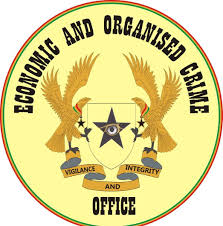EOCO Urges Legal Action Against Landlords Who Rent to Foreigners Without Proper Verification

Dominic Mensah, Staff Officer and Head of the Anti-Human Trafficking Unit at the Economic and Organised Crime Office (EOCO), has called for the criminalisation of renting out properties to foreign nationals without proper background verification. He believes such a measure could significantly reduce incidents of cross-border human trafficking in Ghana.
In an interview with the Ghana News Agency (GNA), Mensah stressed the urgent need for landlords to be held accountable for who they rent to, especially when it involves foreign tenants. According to him, most human trafficking operations in Ghana involve foreign individuals, and unregulated rental practices create loopholes traffickers can exploit.
“Approximately 80 percent of our human trafficking cases involve foreign nationals,” Mensah revealed. “These traffickers often rely on local landlords who fail to conduct due diligence. If we can plug that gap, we can make it far more difficult for such networks to function.”
He proposed that landlords should be legally required to confirm the identities and immigration status of all prospective tenants before signing rental agreements. This includes requesting valid passports, residence permits, and work authorisations where applicable.
Mensah warned that the lack of checks has created an enabling environment for traffickers, who use rented apartments and houses to hide victims and carry out their illegal activities under the radar. He emphasized that while some property owners may unknowingly assist criminals, ignorance cannot continue to shield them from legal responsibility.
“Landlords must understand the role they play, whether intentionally or not,” he stated. “Turning a blind eye to who you’re renting to can have serious consequences—not just for the victims, but for the landlords themselves and the wider community.”
In addition to calling for stricter rental laws, Mensah also advocated for more aggressive enforcement of asset seizure policies in cases related to human trafficking. He noted that traffickers often place greater value on their financial assets than on their personal freedom, making asset forfeiture a more powerful tool than imprisonment alone.
“From our experience, losing money and property hurts criminals more than jail time,” Mensah explained. “When you hit them where it matters most—their wealth—you take away the incentive to keep operating.”
To this end, he recommended building the capacity of law enforcement agencies to effectively trace, seize, and convert assets obtained through trafficking-related crimes. He called for investment in training, technology, and inter-agency collaboration to improve the efficiency and transparency of asset recovery processes.
“Asset seizure should not just be a legal formality—it should be an effective deterrent,” he noted. “If we can take away the profits of human trafficking, we make it a less attractive business for criminals.”
Mensah further emphasised the importance of long-term public education campaigns and stakeholder collaboration to combat human trafficking. He said it is crucial to continuously raise awareness among landlords, community leaders, and the general public about the signs of trafficking and the legal responsibilities individuals have to report suspicious activity.
“Fighting human trafficking requires an all-hands-on-deck approach,” he said. “No single agency can tackle this problem alone. We need collaboration between the police, immigration, civil society, local communities, and government bodies.”
He added that regular training and resourcing of law enforcement officers, combined with stronger partnerships at both the national and community levels, would create a more coordinated and effective response to trafficking threats.
Mensah’s recommendations come at a time when Ghana continues to be both a source and transit country for victims of human trafficking. With the right legal frameworks, vigilant communities, and focused enforcement, he believes the country can make substantial progress in disrupting trafficking networks and protecting vulnerable individuals.







